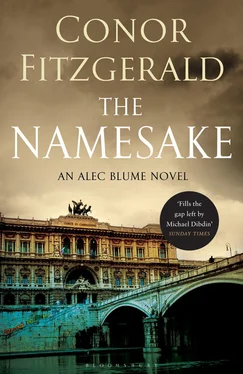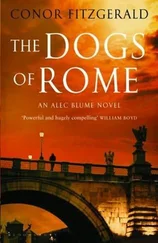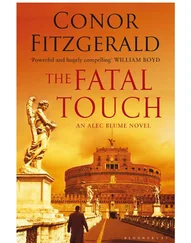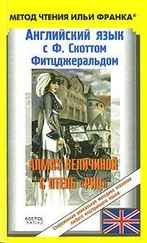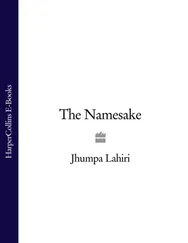Conor Fitzgerald - The Namesake
Здесь есть возможность читать онлайн «Conor Fitzgerald - The Namesake» весь текст электронной книги совершенно бесплатно (целиком полную версию без сокращений). В некоторых случаях можно слушать аудио, скачать через торрент в формате fb2 и присутствует краткое содержание. Жанр: Полицейский детектив, на английском языке. Описание произведения, (предисловие) а так же отзывы посетителей доступны на портале библиотеки ЛибКат.
- Название:The Namesake
- Автор:
- Жанр:
- Год:неизвестен
- ISBN:нет данных
- Рейтинг книги:3 / 5. Голосов: 1
-
Избранное:Добавить в избранное
- Отзывы:
-
Ваша оценка:
- 60
- 1
- 2
- 3
- 4
- 5
The Namesake: краткое содержание, описание и аннотация
Предлагаем к чтению аннотацию, описание, краткое содержание или предисловие (зависит от того, что написал сам автор книги «The Namesake»). Если вы не нашли необходимую информацию о книге — напишите в комментариях, мы постараемся отыскать её.
The Namesake — читать онлайн бесплатно полную книгу (весь текст) целиком
Ниже представлен текст книги, разбитый по страницам. Система сохранения места последней прочитанной страницы, позволяет с удобством читать онлайн бесплатно книгу «The Namesake», без необходимости каждый раз заново искать на чём Вы остановились. Поставьте закладку, и сможете в любой момент перейти на страницу, на которой закончили чтение.
Интервал:
Закладка:
‘That’s a hell of a story about the car.’
‘Yeah. It’s gone, too. Zio must have taken it. It’s a pity your father’s not here for you.’
‘Maybe he went straight to Polsi, to avoid certain people,’ said Ruggiero. ‘You never know.’
‘Yeah, could be. Our dads were booked on the same flight, but yours pulled out at the last moment.’
‘He’ll have had his reasons.’
Enrico lowered his voice. ‘My dad is fucking raging at Uncle Pietro for disappearing like this. Says Pietro never acted responsibly. Says that’s why no one ever tells Pietro anything.’ He raised his voice again. ‘Let’s hope we meet there, then. Let me know, huh? Also if you see Pietro…’
‘No problem,’ said Ruggiero, hanging up, and tossing his phone onto his bed.
Ardore
Lacking a watch and deprived of his phone, he measured his time in cups of water and in the inches of progress he was making in scraping away the sharp limestone and daubs of cement around the bottom hinge of the door. He was using a rusted fork and a flat butter knife for the purpose. In his pocket was an old lever-type opener with which he had stabbed open a can of soup and drained the unheated contents into his mouth. He might make better progress on the cement if he used the opener, but if it broke, he would not be able to open any of the remaining cans, though some of them had swollen so much that they looked like they might explode if he merely tapped them.
Sometimes he turned off the lamp and worked for as long as he could in the darkness. Occasionally he thought he heard buzzing and saw a glow from where the body lay in the corner of the cave, but he knew it was just his mind playing tricks. Rigor mortis, livor mortis and algor mortis. The rigor had come and perhaps was gone already. The body temperature should be coming down to that of the cave, which, to Blume, seemed increasingly cold.
It was a fork, not a knife, that first penetrated through to the other side. Blume tried to peer through the tiny hole he had made, but could see nothing. His hands were puffed and watery with burst and swelling blisters, but it would surely take only five or six more hours increasing the size of the hole, weakening the hinge, though he could hardly remember why he wanted to.
A shiver ran down his back and shot forward suddenly into his stomach making him gasp. His bowels seemed to loosen. With great effort, he controlled himself, clutching his stomach and sweating. He needed to find a place. But after he had gone a few paces, the sensation passed. It would return, and he needed to choose a place to serve as his latrine. Not near the water. Next to the body was too disrespectful. He picked up his lantern and walked over to where the corpse lay, whiter than ever, the mouth a black hole, the eyes devoid of all colour, the pupils not even visible. He passed by it hurriedly, and found a small declivity that could be used.
When he was finishing up, he gathered up the lantern again, then roared and instinctively flung the lamp beside him at the corpse. The head that had been staring up at the roof of the cavern had turned and was watching him as he squatted. The mouth was grinning, and making a sound.
The lantern bounced, cracked and went out and the dark arrived at the speed of light. The totality of the darkness caught him unprepared again. He struggled upright, brought his fingers up to his face, and touched his eyelids a few times, checking that his eyes were in fact open. By rubbing them, he could produce deep purple blots that floated in the air and comforted him a little. Pietro’s face had been so white it must surely still be visible, yet it, too, had been completely swallowed by the darkness. He closed his eyes, opened them: no difference. But the tiny buzzing sound persisted.
If rigor mortis had just worn off, it was perfectly possible for the head to move, the jaws to slacken. The faint buzz he had heard had not necessarily come from the mouth, and it was still going on. Faraway flies made that sound. He thought he could smell the beginning of the decay, or maybe it was just the smell that Pietro had carried with him in life. How much time had passed?
Extending his hands in front of him, he took a careful step forward and immediately almost tripped on the irregular surface. He needed to take baby steps. He could not afford to fall and injure himself. In his mind’s eye, he tried to replay where he had hurled the lamp, how it had illuminated the corpse, then dashed itself against the rock behind. It made better sense for him to get back to the table, which still had two more lamps. But the table was so far away and he was not sure of the right direction.
He reckoned he was a third of the way back when his foot stepped on something soft and yielding. He poked at it for a moment, then kicked in frustration and heard something like an exhalation followed by a sloshing sound. He had hardly made any progress and was only now drawing level with the corpse. He edged his way past, tapping at it with his feet, finally finding the skull, and then took a larger step into the darkness.
His foot tried to find purchase in empty space and he found himself falling, banging his knees and elbow. To save his face he put out his hands. He heard his skin rip, and felt pain, but it was poorly localized. He could not tell which hand he had damaged until he felt the blood tickling his left arm. He lay there for some time, promising himself that he would not panic. All he had to do was cover twenty paces. The length from his desk in his office to Caterina’s desk in the next room. How he missed that now. He wanted back all that he thought he hated about Rome: the extravagant noise, the idiots outside bars broadcasting their opinions. He thought of the vile cologne-scented politicians striding by in silver suits and fluffed-up ties who passed through Piazza Collegio Romano, bawling obscenities into their phones, mainly for the benefit of the people they knew were watching. He even missed that. He missed people.
At a certain point — he had no idea how long it had been since he started his interminable journey across the floor of the cave — he sat down and gave up. It had been long enough for the blood to stop flowing so freely down his arm and turn sticky and hard. The costive trickle of water was no longer functioning as a point of reference. It seemed to be coming from everywhere. The sensible thing was to catch some sleep and rest his mind.
His hand found a smooth slab. The rocks behind were jagged, but the slab was comfortable, if cold. Lying down might be dangerous: he was exhausted, he had lost blood, he had not slept properly and all he had eaten was a can of cold soup. He could taste its saltiness now, and he dearly wished he had had another. He decided just to sit for a while, without sleeping, and let his thoughts collect themselves. He had read somewhere that it took only a few days after the onset of blindness before the brain started remapping some of the mind’s spatial functions to the ears. Or maybe a few months. Whatever: he’d be dead before he was Batman.
He wondered how Caterina was getting on. She was probably in bed now, deep asleep and warm. He could have taken the suitcase stuffed with his parents’ memories round to her place a few days earlier. Sort of like inviting the dead parents round. What had made him throw it into a camper van travelling south? Those were among the last things he had belonging to them. Except… he put his bloody hand into his pocket and felt the three rings.
There was the buzzing again, so faint it was no more than a whine, but it interfered with the sound of the water. Two sounds plus his own breathing, and sometimes, he had noticed, he talked out loud to himself. He sniffed at the darkness, but could not smell. Was the whole cavern impregnated with the stench of death and he no longer noticed? Not noticing could be a sign that he, too, was dead. He opened his mouth and swallowed the air, as black as the inside of Pietro’s mouth. No, I am still alive. Cogito ergo sum.
Читать дальшеИнтервал:
Закладка:
Похожие книги на «The Namesake»
Представляем Вашему вниманию похожие книги на «The Namesake» списком для выбора. Мы отобрали схожую по названию и смыслу литературу в надежде предоставить читателям больше вариантов отыскать новые, интересные, ещё непрочитанные произведения.
Обсуждение, отзывы о книге «The Namesake» и просто собственные мнения читателей. Оставьте ваши комментарии, напишите, что Вы думаете о произведении, его смысле или главных героях. Укажите что конкретно понравилось, а что нет, и почему Вы так считаете.
